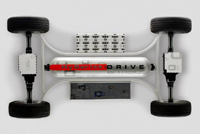Electric Renault-Nissan cars to be sold in Israel in 2011
Renault said Monday that its Renault-Nissan alliance planned to sell thousands of electric cars in Israel in 2011 – in the first example of mass commercialization of no-emission vehicles.

The preliminary deal is to be signed by Carlos Ghosn of Renault-Nissan and Israeli entrepreneur Shai Agassi. At least, 500,000 battery-charges stations will be sold.
The electric car, EV, or simply electric vehicle is a battery electric vehicle (BEV) that utilizes chemical energy stored in rechargeable battery packs. Electric vehicles use electric motors and motor controllers instead of internal combustion engines (ICEs). Vehicles using both electric motors and ICEs are examples of hybrid vehicles, and are not considered pure BEVs because they operate in a charge-sustaining mode. Hybrid vehicles with batteries that can be charged externally to displace some or all of their ICE power and gasoline fuel are called plug-in hybrid electric vehicles (PHEV), and are pure BEVs during their charge-depleting mode. BEVs are usually automobiles, light trucks, neighborhood electric vehicles, motorcycles, motorized bicycles, electric scooters, golf carts, milk floats, forklifts and similar vehicles.
BEVs were among the earliest automobiles. BEVs produce no exhaust fumes, and minimal pollution if charged from most forms of renewable energy.
Subscribe to Pravda.Ru Telegram channel, Facebook, RSS!




